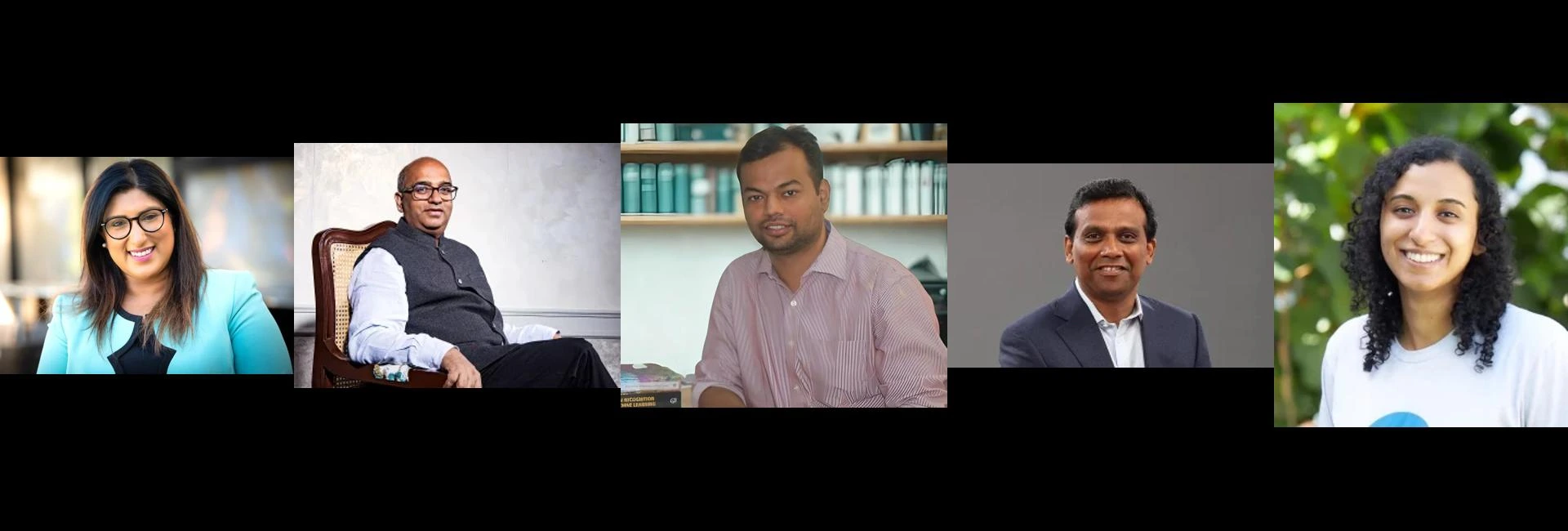(September 6, 2025) The 2025 edition of TIME100 AI—Time’s list of the 100 most influential people in artificial intelligence is out, spotlighting the leaders steering one of the century’s most disruptive technologies. Among the influential names on the list are powerhouses like Elon Musk, CEO of Tesla and SpaceX and the force behind xAI; Sam Altman, the OpenAI chief who turned ChatGPT into a household name; Jensen Huang, NVIDIA’s co-founder and CEO whose chips fuel the AI boom; Mark Zuckerberg, Meta’s founder pushing open-source AI at scale; and Andy Jassy, the Amazon CEO steering AWS as a global AI backbone.
Alongside these trailblazers, the list makes room for Indian-origin leaders whose work reflects the breadth of AI’s possibilities. Some are driving national strategies, others are ensuring inclusion through language access, reimagining corporate structures, or pushing the boundaries of creativity and climate solutions. Together, they represent not just technical brilliance but also a vision of AI that is deeply rooted in equity, sustainability, and cultural context. While Mitesh Khapra and Abhishek Singh are driving AI efforts from India, the other leaders on the list are of Indian origin but based overseas. Global Indian puts a spotlight on the seven AI leaders who represent different facets of AI’s global revolution.
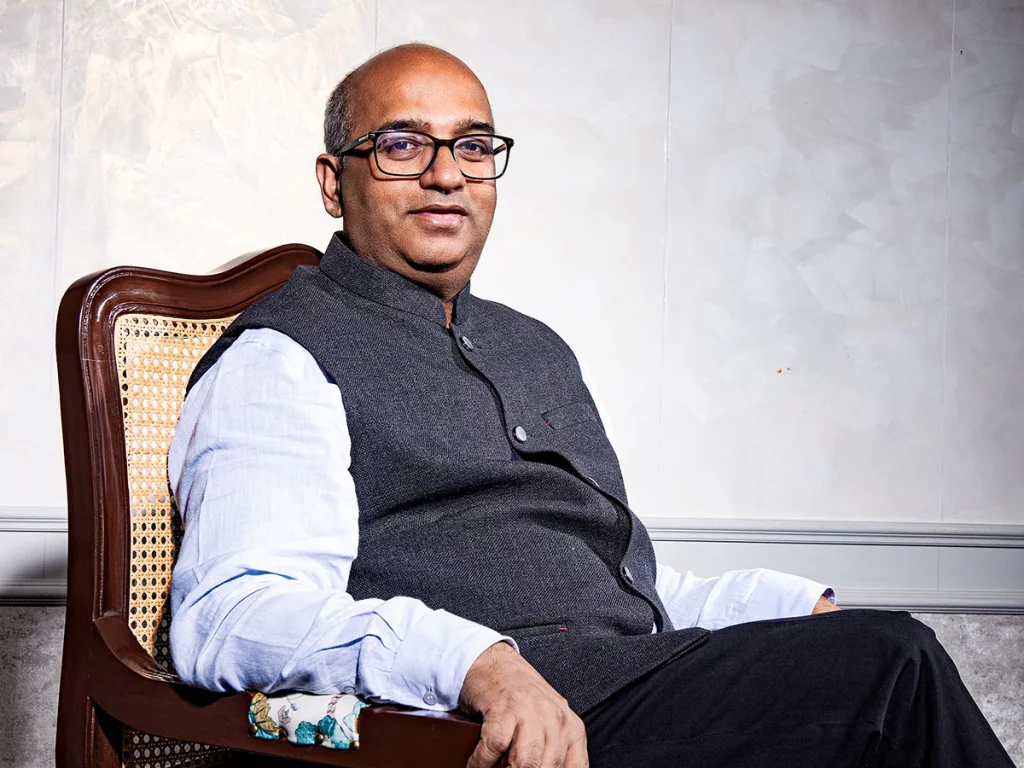
Abhishek Singh
Abhishek Singh, CEO, IndiaAI Mission
Driving India’s AI mission for public good
Few government projects move quickly, but Abhishek Singh is defying the odds. After three decades in India’s civil services, he now leads the IndiaAI Mission, a seven-pillar national strategy to democratize access to AI. He works with the vision that AI should reach the 500 million Indians still offline, whether through voice interfaces for farmers or health apps diagnosing autism. So far, the initiative has supported 30 AI applications across sectors like agriculture, climate, and healthcare. Singh has built partnerships with the Gates and Wadhwani Foundations, arranged access to 35,000 powerful AI chips (GPUs) at affordable rates, and brought together talent from both government and industry.
His optimism is infectious as Singh believes India will showcase remarkable progress at the 2026 Global AI Summit in New Delhi. For a nation of 1.4 billion, the stakes are enormous. Singh’s leadership is ensuring that AI is not just a tool for tech elites but a public good with real-world impact.
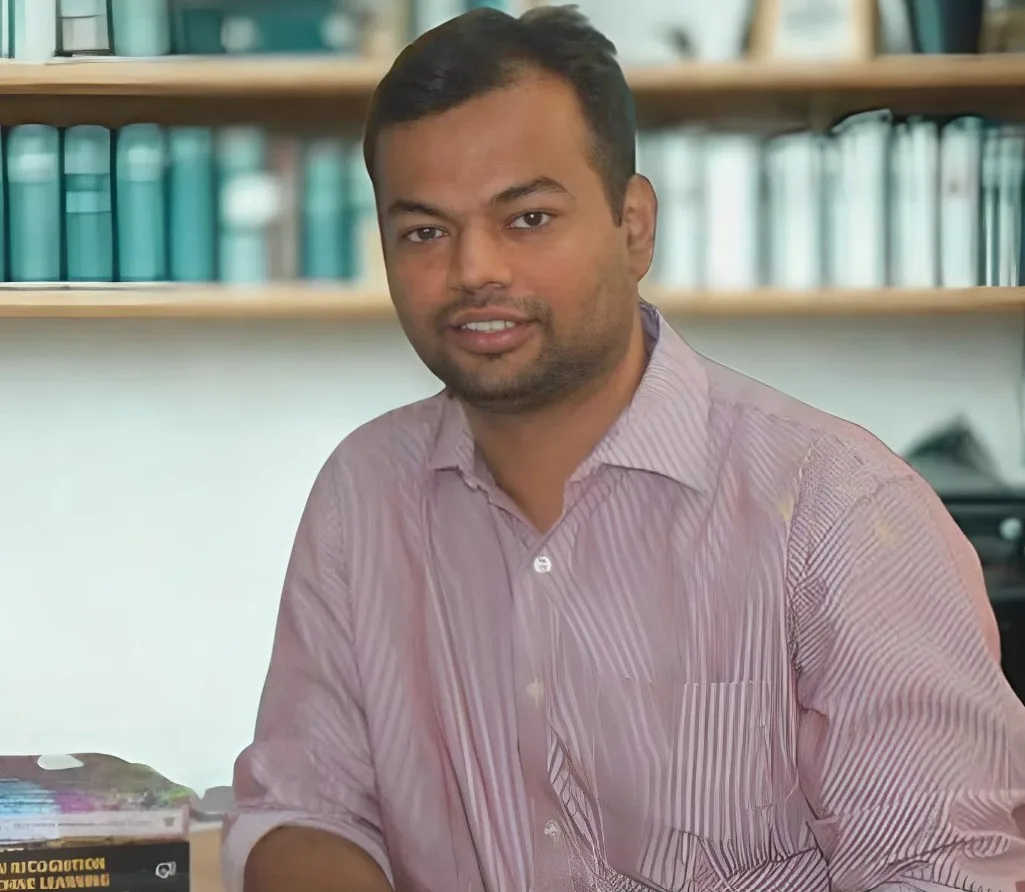
Mitesh Khapra
Mitesh Khapra, Associate Professor, IIT Madras & Co-founder, AI4Bharat
Building the language data backbone for India’s AI future
While Western AI models excel at English or widely represented tongues like Hindi, they stumble when confronted with India’s full linguistic diversity. Mitesh Khapra, an associate professor at IIT Madras, recognized this gap early and co-founded AI4Bharat in 2019 to address it. His team traveled to nearly 500 of India’s 700 districts, collecting thousands of hours of speech from people across socioeconomic and educational backgrounds, capturing all 22 official Indian languages. That data now powers India’s Bhashini program, which aims to make digital services accessible in local languages. AI4Bharat supplies 80 percent of the program’s datasets, making it indispensable to India’s language AI ecosystem. Its models are already in use, translating documents in the Supreme Court, and powering voice bots that farmers use to report subsidy issues.
Khapra and his colleagues also co-founded Sarvam AI, now building India’s first indigenous foundation model. Even if early results lag behind Western giants, Khapra insists sovereignty is the goal: “Unless we learn that skill, we will always be in a dependent position,” he argues. Already, his work is shifting Indian academia. PhD students who once focused on English Natural Language Processing (NLP) are now tackling Indian languages thanks to AI4Bharat’s open datasets. In a world where digital equity hinges on language, Khapra is ensuring India’s voices are heard, literally and figuratively.
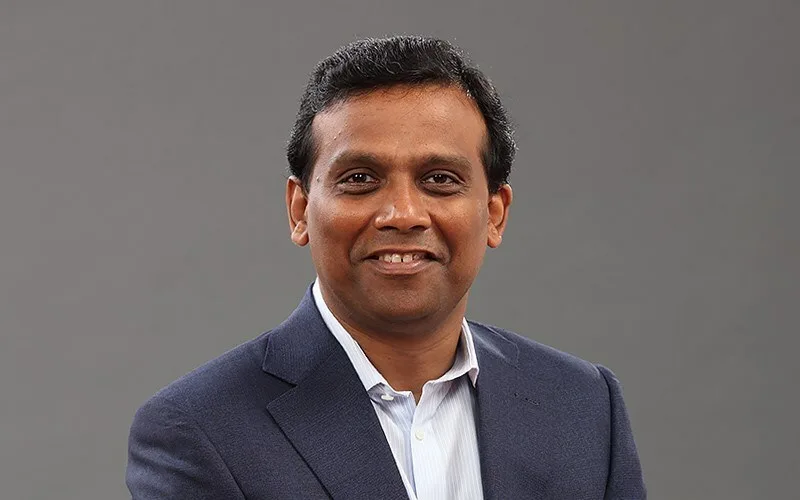
Ravi Kumar
Ravi Kumar, CEO, Cognizant
Reimagining enterprises with an AI vision
As CEO of Cognizant, Ravi Kumar leads a $35 billion IT services giant with over 350,000 employees worldwide. But under his leadership, Cognizant is no longer just an outsourcing powerhouse. It is morphing into an AI-first enterprise. Kumar envisions the rise of “sentient enterprises”—organizations that function less like rigid hierarchies and more like fluid, networked systems, continuously evolving with AI at their core. To realize this vision, he has committed a billion-dollar investment in generative AI, focusing on areas like agentic AI—autonomous AI agents that adapt to company workflows, and context engineering, which trains AI to absorb team culture and decision logic. Cognizant has launched the Agent Foundry platform, secured 59 AI patents, and rolled out Synapse, an upskilling initiative that doubled its target to train two million people in AI skills.
Kumar also emphasizes AI as a democratizer of expertise, not just a cost cutter. Through Cognizant’s Bluebolt program, employees have submitted more than 500,000 AI-driven ideas. Meanwhile, its record-breaking Generative AI Hackathon drew over 50,000 participants, earning a Guinness World Record. Kumar believes that AI won’t just transform enterprises; it will redefine how humans and machines collaborate in the workplace.
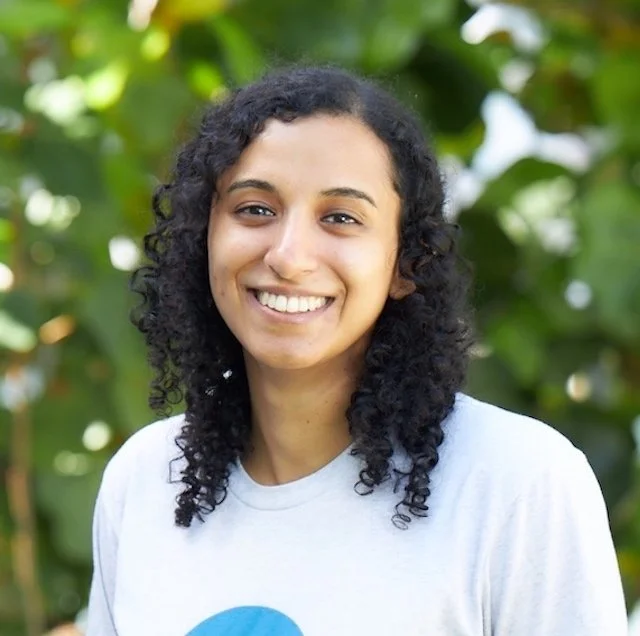
Maithra Raghu
Maithra Raghu, Co-founder & CEO, Samaya AI
Redefining finance with AI
Finance thrives on speed, accuracy, and foresight. These are the qualities that AI can supercharge. Enter Maithra Raghu, a former Google Brain researcher and protégé of Geoffrey Hinton, who co-founded Samaya AI in 2022. Unlike generalist AI systems such as ChatGPT, Samaya is built specifically for the financial sector. Its large language models specialize in analyzing markets, summarizing reports, and even forecasting the ripple effects of policies like U.S. tariffs. This domain-specific focus has already attracted $43.5 million in funding, with backers including Eric Schmidt, Yann LeCun, and Marty Chavez. Wall Street analysts at top firms now trust Samaya AI to generate research. Raghu calls this the future of AI. “Expert intelligence comes from specialization,” she says.
Her latest breakthrough, Causal World Models, goes beyond pattern recognition to simulate complex economic scenarios, providing both qualitative and quantitative insights. In a world awash with financial data, Raghu is positioning Samaya AI as the definitive analyst for hedge funds and investment banks. By betting on specialization rather than AGI, she is rewriting the rulebook for AI in finance.
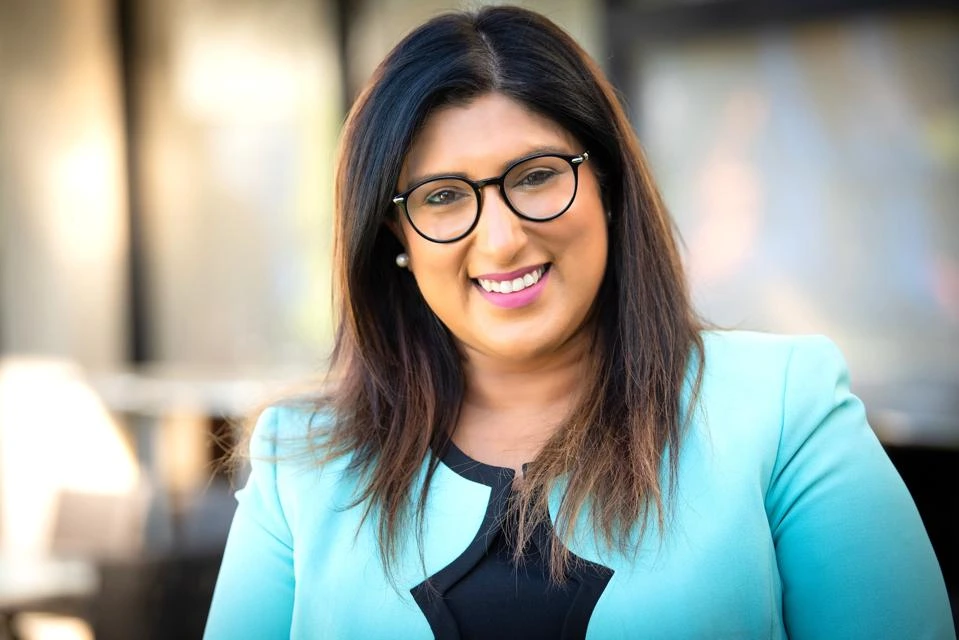
Navrina Singh
Navrina Singh, Founder & CEO, Credo AI
Building trust in AI governance
AI’s rapid adoption has triggered a critical question: Can we trust it? For Navrina Singh, founder of Credo AI, the answer lies in governance. Launched in 2020 after her stints at Microsoft and Qualcomm, Credo AI provides cloud-based tools that help enterprises detect and mitigate risks like bias, security flaws, and compliance gaps, before they spiral. In just five years, the company has quadrupled revenue, doubled its client base, and retained 100 percent of customers. Its clients ranging from Mastercard to McKinsey use Credo AI to monitor everything from hallucinations in chatbots to regulatory compliance. Singh’s role extends beyond entrepreneurship: she sits on the U.S. National AI Advisory Committee, advises the OECD, and contributes to the U.N. AI Advisory Board.
Her mission is to make risk management not a barrier but a catalyst for scaling AI. “You can’t solve for something you don’t see,” she reminds businesses. In doing so, Singh is positioning Credo AI as the gold standard for responsible AI, proving that oversight isn’t an obstacle to innovation, rather it’s the foundation for its longevity.

Priya Donti
Priya Donti, Assistant Professor, MIT & Co-founder, Climate Change AI
Powering renewable grids with AI
Climate change is not an abstract problem, rather an urgent crisis. Priya Donti, assistant professor at MIT and co-founder of Climate Change AI, is harnessing machine learning to tackle one of its toughest challenges which is integrating renewable energy into power grids. Her algorithms are already at work. The UK’s national grid uses her demand forecasting model, while U.S. utilities pilot her voltage estimation tools. She and her team also develop datasets and benchmarks to accelerate innovation in climate-focused AI. Beyond research, her nonprofit has trained 16,000 learners through workshops and summer schools, fostering a global community of AI-for-climate practitioners.
Donti’s vision extends to policymaking: she co-authored the field-defining paper on AI and climate change, which is now a reference point for researchers worldwide. As grids incorporate more solar and wind, balancing supply and demand becomes harder. Donti’s work is ensuring that this transition is not only possible but resilient. In her words, the power sector is facing these challenges “literally right now.” Her AI-driven solutions may well be the difference between an unstable grid and a sustainable future.
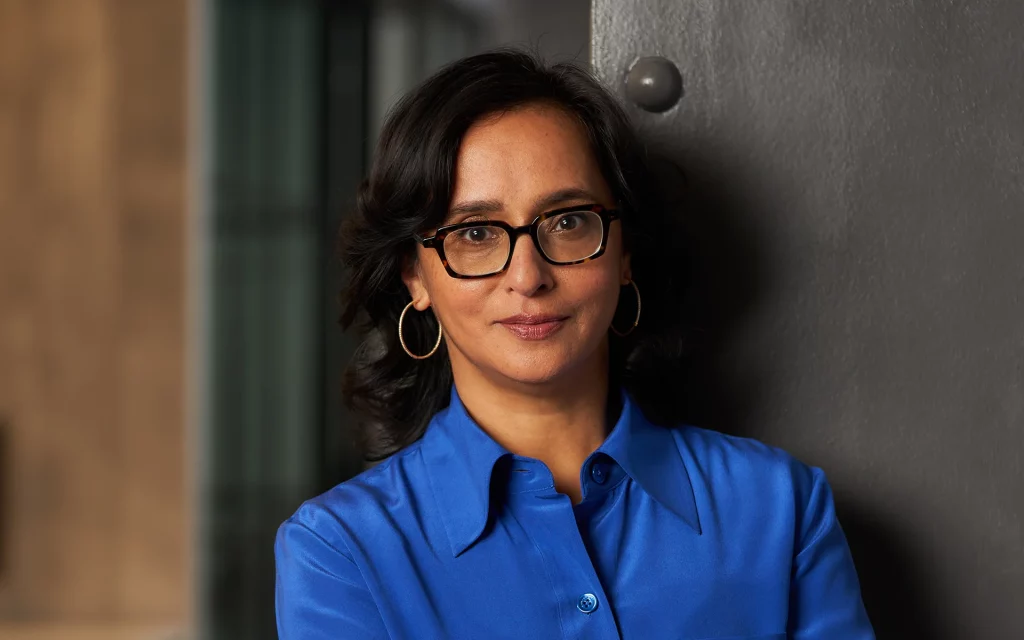
Kakul Srivastava
Kakul Srivastava, CEO, Splice
Humanizing music with AI
For decades, the music industry has oscillated between innovation and disruption. Kakul Srivastava, CEO of Splice, is threading the needle by introducing AI tools while keeping artists at the center. Splice, already one of the largest marketplaces for music samples (boasting 3 million+ sounds), has powered hits like American singer Sabrina Carpenter’s Espresso. Under Srivastava, Splice has introduced discovery AI that helps musicians surface samples by harmony, genre, or instrument. Its mobile app allows users to hum a melody and get AI-suggested samples to build on. A new suite of beta tools can even turn any sound into a playable instrument.
Yet Srivastava insists Splice is not about “push-button creativity.” Every sample originates from a human artist, with automatic licensing ensuring fair compensation. Her philosophy is clear: AI should augment creativity, not erase it. In an era of deepfakes and synthetic voices, Srivastava is charting a middle path where technology amplifies artistry while preserving its human soul.
Time’s 2025 100 Most Influential People in AI list point towards the fact that future of AI is being shaped not just in Silicon Valley boardrooms but also in Indian universities, startups, and ministries. Figures like Musk, Altman, Huang, Zuckerberg, and Jassy may dominate headlines, but Indian-origin leaders are also boldly shaping the ethics, applications, and inclusivity of AI worldwide. From Mitesh Khapra’s linguistic datasets to Priya Donti’s climate algorithms, from Navrina Singh’s governance frameworks to Abhishek Singh’s public initiatives, these changemakers are ensuring AI serves not just shareholders but societies at large. In their hands, AI becomes not only a tool of power but also a pathway to equity, sustainability, and human creativity.
ALSO READ: The TIME AI Vanguard: 6 Indian innovators redefining the future of artificial intelligence
